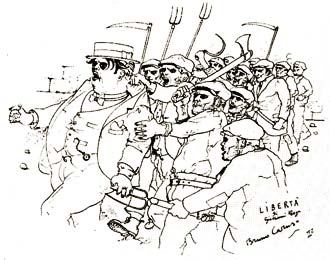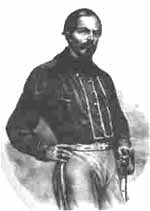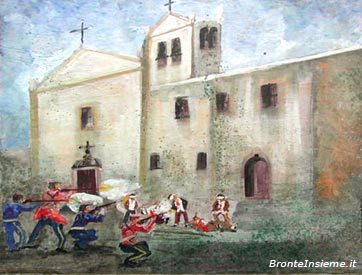The hopes of the farmers, all poor laborers, had been suddenly re-lighted, they wanted to re-appropriate of the state properties and of the immense land property usurped twice by the Hospital In Palermo (1494) and by the admiral Nelson (1799). And the gigantic case undertaken by the brontese community against the usurpers for three centuries (had lasted since 1554 and it had not been yet concluded ), could finally have an end.  The anger, for long repressed, of the farmers exploded in forms of atrocious violence also for the infiltration of the many elements escaped from jail in all of Sicily and the contemporary arrival, from surrounding country towns, of other individuals not very reliable. The anger, for long repressed, of the farmers exploded in forms of atrocious violence also for the infiltration of the many elements escaped from jail in all of Sicily and the contemporary arrival, from surrounding country towns, of other individuals not very reliable.
«Had got back to Bronte, from the jails, some criminals, known for killings and robberies. The rumbling in Bronte attracted also, as vultures to the smell of carrion, other lawless elements from Adernò, Biancavilla, Pedara, Alcara Li Fusi». (Benedetto Radice, Nino Bixio a Bronte). On August 4 a company of the National Guard reached Bronte from Catania to restore the order, but the riots continued. On August 5, on Sunday, a company of soldiers arrived in Bronte and the crowd started to calm down. Garibaldi, camped in the river bed of S. Filippo, in the near south periphery of Messina, more to protect the interest of the English property owners, (these were the pressing requests of the English consul John Goodwin) that for reasons of public order, decides to send his reliable lieutenant Nino Bixio, camped at Giardini, to go immediately to Bronte and put down the rebellion. Rather than the primary rights of the brontese people, he chose the improper ones of the English citizens. Strangely enough, the rebellion, intended to support the Garibaldian revolution, was stifled by the same Garibaldian chiefs. The British had helped Garibaldi: to the ships of the English fleet, moored in the harbor in Marsala, had been ordered to support the Garibaldian landing, which took place quietly and without any opposition. They could not accept in silence the occupation of the Dukedom by the populace therefore required a vigorous intervention of the Garibaldian troops? On the other hand, the new Italian government, from which was expected the annulment of the gift of 1799, renewed it in his turn and assumed also the burden to pay the canon due to the Hospital In Palermo for property that the Bourbon had assigned in 1799 to the Admiral. Bixio reached Bronte on August 6 with two battalions of bersaglieri, when the rising had exhausted his violent charge and the true authors of the misdeeds had already disappeared in the near countryside ("...the rebels obviously have run away", so Bixio himself wrote to the major Dezza in a letter of August 7). He lodged in the Capizzi College and stayed there only three days. Ordered immediately the state of siege and intimated that all arms would have to be handed over within three hours and a war tax of ten onzes per hour was quickly imposed.  To set an example of severity, as deterrent to other similar situations developing in other towns, he implemented a retaliation without precedents against defenceless farmers, and improvised avenger, turned his fury on the first fellows who fell in the net. To set an example of severity, as deterrent to other similar situations developing in other towns, he implemented a retaliation without precedents against defenceless farmers, and improvised avenger, turned his fury on the first fellows who fell in the net.
He made intervene the «commissione mista di guerra» (mixed war committee), to hold a quick and hasty trial against those who were considered the chiefs of the riot. The matter was liquidated within few days: with extremely grave trial and juridical procedures, the cause was concluded, the evening of August 9, in just four hours. At 12.00 to the defendants (some of them almost illiterate) was given an hour of time to present in writing their defence. Rather than an hour, four of accused presented their paper at 14.30 and this was sufficient for the court to reject everything because the defense had been presented at expired time. The attempts and the disputes of the principal defendant (the lawyer Nicolo' Lombardo) were useless and unsuccessful. He tried with all his strengths to convince the judges of the weakness and falseness of the charges gathered against him. The war committee issued the sentence on Thursday August 9 at 8 p.m.: five people, among which the Avv. Nicola Lombardo (old patriot of liberal education, who had spontaneously presented himself), culprits according to Bixio's judgment and that of the improvised and frightened Committee, were sentenced to death by firing squad.  The lawyer Lombardo Nicolò (truly innocent victim) and the common men Nunzio Spitaleri Nunno, Nunzio Samperi Spiridione, Nunzio Longhitano Longi and Nunzio Ciraldo Fraiunco, the town's idiot, totally infirm of mind, pointed to as the provokers of the sacks and the killings, victims of reasons to them incomprehensible, at the dawn of August 10th, 1860, were shot in presence of all the population in the little square before the church of San Vito. The lawyer Lombardo Nicolò (truly innocent victim) and the common men Nunzio Spitaleri Nunno, Nunzio Samperi Spiridione, Nunzio Longhitano Longi and Nunzio Ciraldo Fraiunco, the town's idiot, totally infirm of mind, pointed to as the provokers of the sacks and the killings, victims of reasons to them incomprehensible, at the dawn of August 10th, 1860, were shot in presence of all the population in the little square before the church of San Vito.
"One of the sentenced, not hit by the shooting discharge, keeping in his hand the image of the Virgin, was shouting": - Grace! Grace! - It was the madman. The officer approached him and gave him" the grace blow. (Benedetto Radice) On August 10th, 1860, together with five unlucky ones, was also dying the warlike spirit of the brontese folks, betrayed by the one in whom they had believed: the "liberator" Garibaldi, behind whom many volunteers from Bronte had gone "to do" the revolution. The action imposed by Bixio to the judges of the mixed war committee was a choice coldly calculated. He was certainly sacrificing justice but fully answering to politic necessities and the hard laws of the war. The shootings gave wide satisfaction to the British nation whose secular interests on the Dukedom had been seriously threatened by the revolutionary wave. In Bronte it wasn't possible to touch these privileges that the people wanted to knock down and that had languished and degraded in poverty for many generations all the brontese community. Few days later Bixio was announcing that "the murderers and thieves of Bronte were strictly punished"... the shooting followed immediately their crimes". |